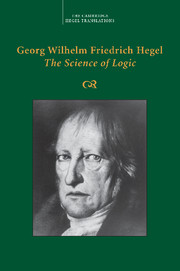Introduction
Published online by Cambridge University Press: 30 September 2021
Summary
PROLOGUE
Writing an introduction to a translation of Hegel's Logic is an even more formidable task than the translation itself. There are serious issues that immediately confront the author, and it will not be amiss to indicate them at the start, and also to declare how I have chosen to settle them. First, there is the issue of defining the task that an introduction should perform. An introduction cannot be a step-by-step guide for the neophyte across the intricacies of the Logic. Fortunately, it need not be. There are already guides of this kind available, some classic, others more recent, all good in their different ways. An introduction may be a general statement about the project of the Logic, its place in Hegel's System, and the key concepts that govern the progression of the categories. But general statements of this kind, while of no use to those already in the know, do little in the way of indicating why the Logic is at least an interesting, and as I believe also still significant, philosophical product. It is not clear, in other words, whether such statements do any work at all. They certainly do nothing to motivate a reading of the Logic and may even simply reinforce well-established prejudices. For this reason, I have decided in this introduction to focus on the Logic's problematic nature as such.My claim is that the Logic is to be read as still in line with Kant's Transcendental Logic, though without being “transcendental” in Kant's sense. But once this determination is made, another issue immediately arises.Of course, however philosophically important the Logic might still be, the fact remains that it is a dated document. Why Hegel should ever have wanted to attempt it needs historical explanation. And this I have done with asmuch detail as space allowed. But the problem is that the moment one departs from a purely historical account and takes a definite stand on the nature of the Logic, one is immediately faced with a host of conflicting interpretations, both classic and recent, and, while one cannot enter in an introduction into an extended polemical debate with them, to ignore them would smack of dogmatism.
- Type
- Chapter
- Information
- Georg Wilhelm Friedrich Hegel: The Science of Logic , pp. xi - lxiiPublisher: Cambridge University PressPrint publication year: 2010

